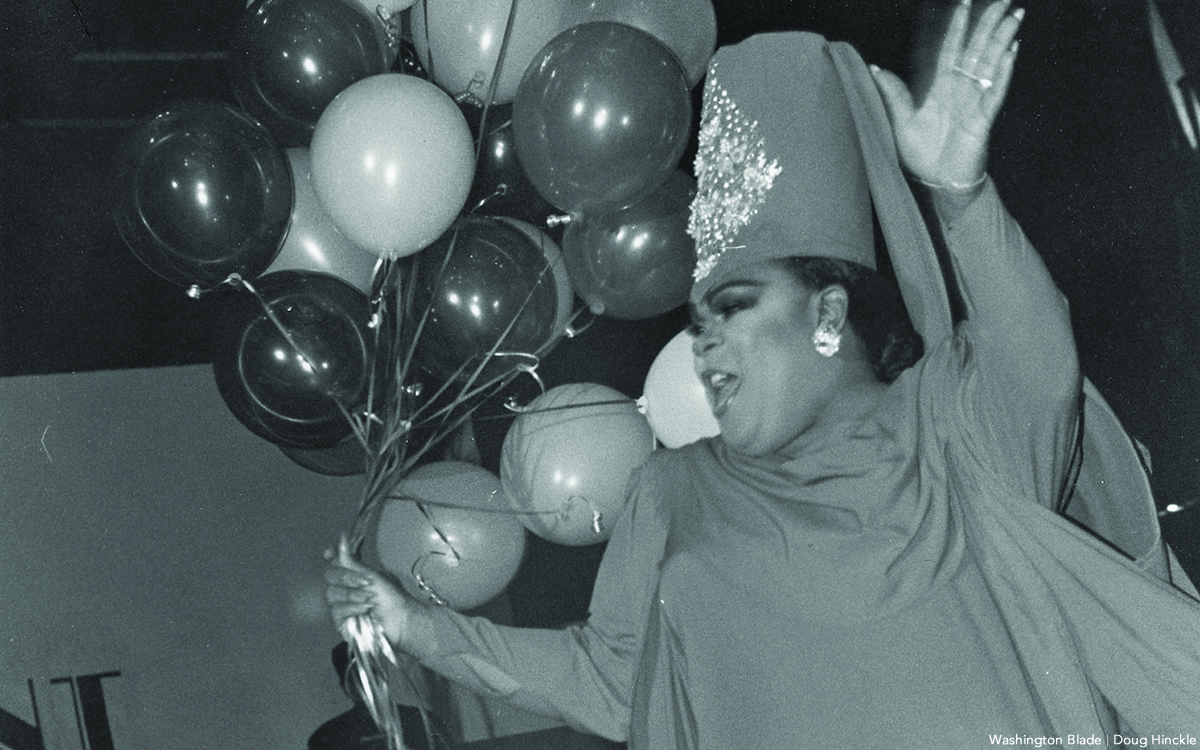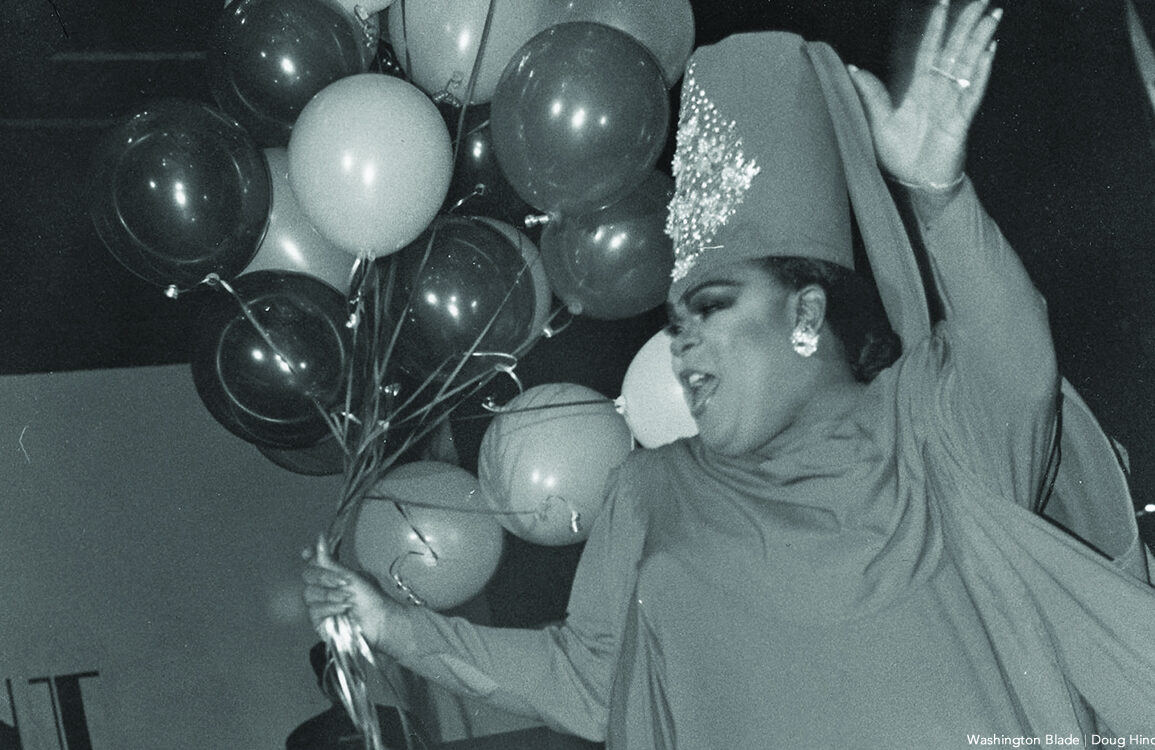Donnell Robinson, who has dazzled audiences in the nation’s capital as the drag personality of Ella Fitzgerald for at least 40 years, has the date of Saturday, March 21, 2020, embedded in his mind.
That was the last time he performed in drag. It was at the popular Southeast D.C. nightclub Ziegfeld’s-Secrets, where Robinson performed as Ella Fitzgerald for nearly 40 years, before it, along with all city nightclubs, bars, and other “nonessential” businesses were ordered temporarily closed by Mayor Muriel Bowser in response to the COVID pandemic.
“That was the last show I did,” Robinson told the Blade in an interview at his apartment in Arlington, Va.
A short time later, around May of 2020, Robinson and all the Ziegfeld’s-Secrets employees and performers learned that the owner of the club’s building at 1824 Half Street, S.W., announced plans to demolish it to build an upscale condo building several years sooner than expected. That meant the club would not reopen when the COVID restrictions were lifted.
“So, what I recall is in May, it was the first week in May, Steven [Delurba, the Ziegfeld’s-Secrets general manager and part owner] called me and said, ‘Honey, do you have anything in the dressing room? Come and get it. The landlord called and said we must be out by the 15th.’”
Robinson said he has fond memories of meeting up with other drag performers, one of the longtime bartenders and other employees who came to retrieve their belongings in the dressing room and other storage spaces in the converted warehouse building that had served as home to Ziegfeld’s-Secrets since 2009.
And it meant at least the temporary end to a 40-year run in which Robinson (aka Ella Fitzgerald) served as emcee and lead drag performer at the Ziegfeld’s-Secrets nightclub, which began in the club’s previous location a few blocks away.
Robinson began performing as Ella Fitzgerald at The Other Side nightclub in 1980, which later changed its name to Ziegfeld’s-Secrets, at its previous location on the unit block of O Street, S.E., before it was displaced in 2006 by construction of the Washington Nationals baseball stadium.

The club did not reopen until 2009, when its owners Allen Carroll and Chris Jensen, were able to obtain a lease for the 1824 Half Street building, which Carroll and Jensen renovated before reopening the club there.
All of that has become the backdrop to Robinson’s excitement over returning to the stage as Ella Fitzgerald at D.C.’s Capital Pride festival on June 11, which will take place on Pennsylvania Avenue with the U.S. Capitol as a dramatic backdrop two blocks behind the stage.
While he’s hopeful that all will go well with his upcoming performance at the Pride festival, Robinson says he is aware of the recent far-right political backlash against drag shows in states across the country.
In addition to proposed laws placing restrictions on drag shows, protests targeting drag shows, including some attempting to disrupt the shows, have also occurred in cities and states, including earlier this year in nearby Silver Spring, Md., and at a drag brunch hosted by a restaurant near the U.S. Marine Barracks on Capitol Hill in D.C.
“I have read about some of that,” Robinson told the Blade. “I haven’t been in the drag scene in three years. But I see and know what’s going on,” he said. “And my fellow drag performers who are older in my generation, I know they may be at risk. And I know I am to a degree,” he continued.
“And it’s a shame that we have to fear that we can’t present our art, our art form of drag and hope that nothing is going to happen to me today,” he said. “Why should we have to even have that thought going through our mind while we’re going through our makeup and getting ready?”
Speaking with the Blade at his apartment, Robinson added, “I’m planning to walk out of here in full drag to go to Pride. And there’s going to be part of me in the back of my mind that I’ve got to watch my back because there may be some idiot out there that doesn’t want to see an old man dress up in sequins and beads.”
“I just don’t understand why people think that drag is going to go away,” Robinson said. “It’s not. It’s more popular now than it ever was because of RuPaul and the drag brunches and the shows that are continuing to go on.”

Robinson, 68, says he was born in Warrenton, Va., and grew up on a farm just outside Warrenton and raised by his grandparents. His first attempt at drag took place while in the 8th grade when he entered a school talent show portraying TV personality Flip Wilson’s drag character Geraldine Jones.
“All of my girlfriends, they helped get it together,” Robinson recalls. “I borrowed the wig from the school librarian,” he said, adding he bought a red dress and borrowed a pocketbook from someone. “And I won the contest.”
He didn’t do drag again until his senior year in high school, Robinson said, when he “pulled out Geraldine again” in a dramatic arts class. “I got an ‘A’ in dramatic arts,” he told the Blade, before graduating from Fauquier High School in June of 1974.
“Then I waited a year or so, and then I came out to do drag in 1975 in the fall,” he said. That began when a friend introduced him to the then gay nightclub Pier 9, located in the building that later became Ziegfeld’s-Secrets, where drag shows were held.
Robinson said he was impressed by the beauty of the drag performers while attending Pier 9 drag shows. “I’m like, oh, so I can do that too,” he said. And that’s exactly what he did. In October of that year, he entered a Halloween costume contest at the Pier, once again as the Geraldine Jones drag character, and won the contest in the comedy category.
From there, Robinson says, through people he met at the Pier he learned of the then D.C. gay bar Plus One on Capitol Hill, which also hosted drag shows. After auditioning and being approved as a drag performer at Plus One, the owner of the club, Bill Oats, assigned him the drag name Fanny Brice.
It was at the Plus One about a year later when Robinson met Mother Mame Dennis, the drag performer and lead organizer of the Academy of Washington, a local drag social club that organized drag events, including the Gay Miss Universe drag competition. The next day, an Academy of Washington member who performed at Plus One brought Robinson to an academy event.
It was there that Mame Dennis approached him and raised the issue of Robinson’s drag name. “She said, ‘Oh my dear, if you want to be in this group you need to change your name immediately,’” Robinson quoted Dennis as saying. “And I was like, yes ma’am. She said you need to be either Nell Carter or Ella Fitzgerald,” Robinson recounted.
“I was being a smart ass. I said, ‘I’ll take Ella Fitzgerald for $2.’ She said, ‘Oh, you’re funny.’ And she named me Ella Fitzgerald,” Robinson remembers. “And I was her first African-American daughter in the group.”
Through the Academy of Washington and others he met through the drag scene at Plus One and other D.C. gay bars, Robinson quickly learned what he calls the art form of drag and developed a following among those patronizing drag shows in D.C. It was through the academy that Robinson also met the owners of the then Other Side nightclub, Chris Jensen and Allen Carroll, who invited Robinson to begin performing at their club.

“There were five of us and we did the show on a Sunday night for 500 women,” Robinson says. “Because, remember, between Washington Square, the earlier name, and the Other Side, it was all women. There were no men allowed until around 1986,” he told the Blade. “So, every Sunday night we were doing drag shows for 500 women, from ’80 until ’85 or ’86.”
Around the time he began performing as Ella Fitzgerald, Robinson also began his other career as a hairstylist, which he says he continues at this time and will celebrate his 40th anniversary as a hairstylist in November of this year.
For much of that time, Robinson has been one of the sought-after stylists at the VSL Hair Salon at 1607 Connecticut Ave., N.W., in the Dupont Circle neighborhood. The salon recently came under new ownership and now operates under the name of Color Lab Salon at the same address.
As Robinson’s reputation as a drag performer became widely known, many of his salon clients referred to him as Ella and were regular patrons of the Ziegfeld’s-Secrets drag show.
By the time Jensen and Carroll renamed the Other Side as Ziegfeld’s-Secrets and through the time it relocated in the building on Half Street, S.W. and until its closing in 2020, Robinson took on the role as the emcee of the club’s Ladies of Illusion drag shows as well as that of one of the city’s most sought after drag performers, according to people who attended his shows.
In an Aug. 2, 2001, lengthy feature article, the Washington Post referred to Robinson and his Ella Fitzgerald character as the “doyenne of Washington drag queens.” The Post article recounted what those who have attended Robinson’s shows already knew – that he also took on the role of a stand-up comedian engaging audience members in on-the-spot banter, often inviting audience members to come on stage to chat with Ella.
“Is that your husband?” the Post article quoted Robinson asking a female audience member at one of the Ziegfeld’s-Secrets drag shows. When the woman replied that the person was her boyfriend, Ella said with an incredulous facial expression, “That little queen?” according to the Post article. The audience roared in laughter.
Robinson says among the highlights of his career as a drag performer have been the recognition he has received from his peers in the drag community, including from the Academy of Washington and its leader Mame Dennis.
“Once I changed my name to Ella Fitzgerald, Mame said, ‘My dear, one day you will be Miss Universe.’ And 10 years later, Mame crowned me Miss Gay Universe. I was the first African-American Miss Universe in 1986,” Robinson recounted.
He said the prospect of resuming his drag performances to the degree he did before Ziegfeld’s-Secrets closed was uncertain, in part, because he is dealing with a bout of sciatica that makes it difficult for him to walk and move about quickly.
“You might see me come out with a cane at the Pride show,” he said with a laugh.




